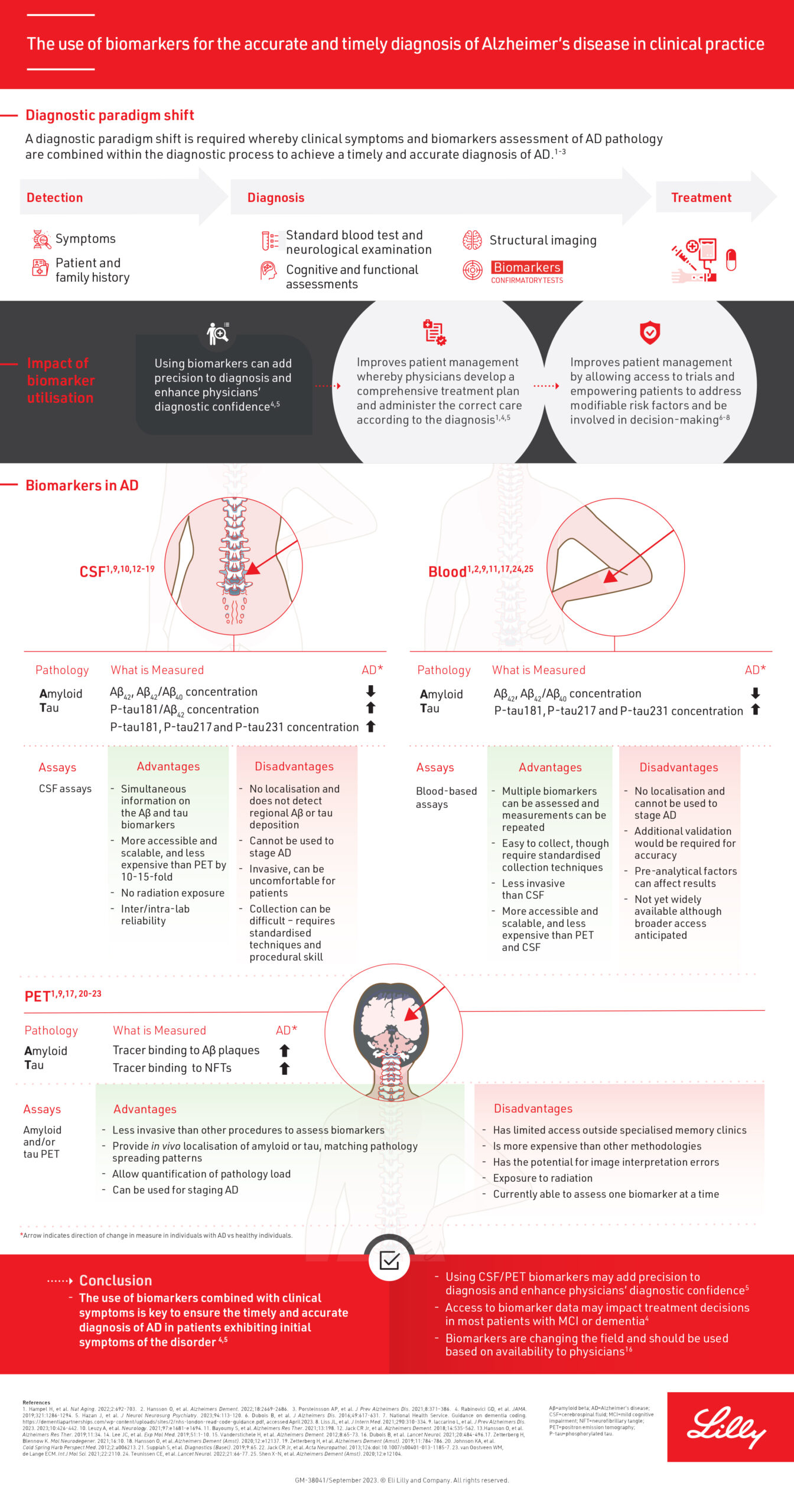touchFEATURE The use of biomarkers for the accurate and timely diagnosis of Alzheimer’s disease in clinical practice
Watch leading experts explain the shifting diagnostic paradigm in Alzheimer’s disease using case studies demonstrating the utility of biomarkers
Alzheimer’s Disease: A Shifting Diagnostic Paradigm
In this video, Prof. Robert Perneczky outlines the shifting diagnostic paradigm integrating clinical and biomarkers assessments in Alzheimer’s disease, and the benefits of an accurate and timely diagnosis. Currently available biomarker options and methodologies and a potential model care pathway are also presented.
GM-44308, PP-AD-AU-0040, PP-AD-BR-0048 (December 2024), PP-AD-PL-0011
view bio and disclosures 1/3 Next ChapterDiagnosing Alzheimer’s Disease: Case Study 1
In this video, Prof. Sylvain Lehmann presents a clinical case study of a patient with progressive memory impairment, and how biomarker analysis in combination with physical and cognitive examinations was used to confirm an Alzheimer’s disease diagnosis.
GM-44312, PP-AD-AU-0041, PP-AD-BR-0049 (December 2024), PP-AD-PL-0012
view bio and disclosures 2/3 Next ChapterDiagnosing Alzheimer’s Disease: Case Study 2
In this video, Prof. Pablo Martinez-Lage presents a clinical case study of a patient with recent problems with memory and finding words, and a family history of Alzheimer’s disease. Biomarkers were used, together with the clinical evaluation, to confirm the etiology of the cognitive symptoms.
GM-44311, PP-AD-AU-0039, PP-AD-BR-0050 (December 2024), PP-AD-PL-0010
view bio and disclosures 3/3 Leave FeedbackOverview & Learning Objectives
Overview
Alzheimer’s disease has historically been diagnosed based on clinical symptoms.1 However, clinical diagnosis has limited accuracy compared with neuropathology biomarkers assessed via positron emission tomography and in cerebrospinal fluid.2 Therefore, Alzheimer’s disease biomarkers may allow for an accurate and timely diagnosis,1 enhancing confidence in the diagnosis,3,4 and impacting treatment decisions.1 In this video, watch leading experts discuss the shifting diagnostic paradigm in Alzheimer’s disease, and the diagnostic role of biomarkers as demonstrated by patient case studies.
Learning Objectives
- Understand the utility of biomarkers for an accurate and timely diagnosis of Alzheimer’s disease, and how to include them in the care pathway
- Describe the biomarkers that are currently available to support Alzheimer’s disease diagnosis, their clinical use and their benefits and limitations
- Understand how biomarkers can allow diagnostic differentiation between cognitive impairment due to Alzheimer’s disease or other potential causes through patient case studies
Faculty & Disclosures

Prof. Robert Perneczky
Division of Mental Health in Older Adults and Alzheimer Therapy and Research Center, Ludwig Maximillians University Munich, Munich, Germany
Robert Perneczky is Professor of Psychiatry at Ludwig Maximilians-University (LMU) Munich and director of the Division of Old Age Psychiatry and the Alzheimer’s Research and Therapy Centre at the LMU University Hospital. He has over 20 years of experience with translational dementia research, focusing on imaging and fluid biomarkers, amongst other areas of interest, and has published over 200 peer-reviewed articles.
Prof. Robert Perneczky has received advisory boards and speaker fees from AstraZeneca, Biogen, EISAI, Eli Lilly, Grifols, Janssen-Cilag, Novo Nordisk, Roche, Schwabe and Tabuk.

Prof. Sylvain Lehmann
University Hospital of Montpellier, Montpellier, France; Institute of Neurosciences and the Center of Excellence in Neurodegenerative Diseases, Montpellier, France
Sylvain Lehmann is head of the Montpellier Center of Excellence in Neurodegenerative Diseases and the Director of the Institute for Neurosciences of Montpellier (INM). His interests include various aspects of neurodegenerative disorders including therapy, diagnosis, pathophysiology and clinical proteomics. He is an author of 250 peer-reviewed publications.
Prof. Sylvain Lehmann has received consultancy, training, symposium and collaboration fees from AbbVie, Biogen, Eli Lilly, Fujirebio, Quanterix, Roche Diagnositics, Shimadzu and Spectrum

Prof. Pablo Martinez-Lage
Center for Research and Advanced Therapies of the Foundation CITA-alzhiemer Fundazioa, San Sebastian, Spain
Pablo Martinez-Lage is director of the Neurology area at the Center for Research and Advanced Therapies of the Fundacion CITA-alzheimer Fundazioa in San Sebastian. His main research interests include the neuroimaging, neuropsychological and clinical characterization of pre-clinical and early Alzheimer’s disease, in addition to mild cognitive impairment, vascular dementia, focal atrophies and frontotemporal dementias. He has published over 80 peer-reviewed articles.
Prof. Pablo Martinez-Lage has received advisory board and speaker fees from Pfizer, Novartis, Lundbeck and Janssen-Cilage; Speaker fees from Andromaco Grünenthal, Eli Lilly and Esteve.
References
- Hampel H, Au R, Mattke S, et al. Designing the next-generation clinical care pathway for Alzheimer's disease. Nat Aging. 2022;2(8):692-703.
- Jansen WJ, Janssen O, Tijms BM, Prevalence Estimates of Amyloid Abnormality Across the Alzheimer Disease Clinical Spectrum. JAMA Neurol. 2022;79(3):228-243.
- Mouton-Liger F, Wallon D, Troussière AC, et al. Impact of cerebro-spinal fluid biomarkers of Alzheimer's disease in clinical practice: a multicentric study. J Neurol. 2014;261(1):144-51.
- Rabinovici GD, Gatsonis C, Apgar C, et al. Association of Amyloid Positron Emission Tomography With Subsequent Change in Clinical Management Among Medicare Beneficiaries With Mild Cognitive Impairment or Dementia. JAMA. 2019;321(13):1286-1294.


